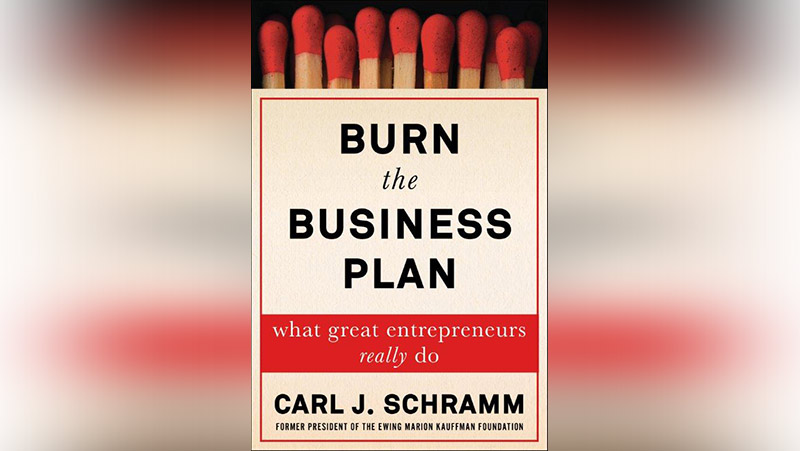As for the essentials of what breakaway brokers need to know, it’s a good bet that Professor Carl J. Schramm will live up to his nickname, “The Evangelist of Entrepreneurship,” so dubbed by The Economist. Not only does he preach entrepreneurship, he’s a major myth-buster when it comes to the nitty-gritty of business startups, as he tells ThinkAdvisor in an interview.
The Syracuse University professor argues, provocatively, that in launching a new business, there’s absolutely no need for a business plan. In fact, he called his new book “Burn The Business Plan: What Great Entrepreneurs Really Do” (Simon and Schuster).
In the interview, the economist, 70, reveals just why a plan isn’t necessary. After all, revolutionary companies ranging from Procter & Gamble and General Electric to Amazon and Facebook had none, he stresses.
The former president of the entrepreneurship-promoting Ewing Marion Kauffman Foundation and a consultant about innovation to large companies (carlschramm.com), he also talks about why four out of five start-ups fail within the first 10 years — and how to avoid such disaster.
A venture investor, he has founded or co-founded five companies in health care, finance and information technology and is former chair of the Commerce Department’s Advisory Committee on Measuring Innovation in the 21st Century Economy.
Schramm maintains that entrepreneurship has been misrepresented and glamorized, and that the best way to succeed as a business owner is to first gain experience and insight by working in a large corporation.
ThinkAdvisor recently interviewed the professor, on the phone from his office near Baltimore. He presented do’s and don’ts for starting a business that are likely to be of value to large-firm advisors flirting with the idea of going on their own or those who are already putting such a plan into action. Here are excerpts from our conversation:
THINKADVISOR: What are the chances of entrepreneurial success for a financial advisor who’s been working at a large firm?
CARL SCHRAMM: The odds aren’t against them. The whole issue is brand. If you’re working at, say, Fidelity or Morgan Stanley, the brand protects you. The advisors who are ready to break out know that what they want to do for their clients is better, on average, than what the big bank they work for [provides]. The trick is getting people to go with you and that, performing with your own research on the outside, you have confidence you’ll be as protected as you were being with a huge institution.
Conventional wisdom says that when starting a business, you need a business plan. Why do you disagree?
A business plan doesn’t really help you have a successful business. Secondly, there’s the cost in terms of time to develop one. Third, the business plan was invented principally as a way of communication between an aspiring entrepreneur and the venture capital community. But venture capital backs less than 1% of all new businesses every day. So there’s no reason to create a document to talk to people you’ll never talk to.
Didn’t companies that grew to be very large start out with a business plan?
Most businesses never had a business plan, which is a relatively new idea. There was no business plan for Procter & Gamble, Alcoa, General Electric, General Motors, American Airlines — or for Google, Amazon, Apple, Microsoft or Facebook.
Any other reasons for a business plan’s being unnecessary?
The notion of an exit strategy — getting out within five or six years [or other timeframe] — is totally foreign to the concept of why anybody would start a business. That notion never existed when most businesses were created. When GE was put together, the thought was that it would be around forever, just like the railroad companies and the banks.
 “Burn the Business Plan” by Carl Schramm
“Burn the Business Plan” by Carl Schramm
You write that, nowadays, as more business plans are being written, there’s an increasing number of startups that fail. Surprising.
Twenty years ago the U.S. was benefiting from one 1 million startups a year. Ten years ago it was about 700,000 a year. This year there will be fewer than 500,000 startups. This has been a period in which the business plan was created as [a] way to recruit investors. It was also the period in which we invented business incubators. So the more you allegedly support new businesses, fewer new businesses get started.
What are the top reasons for financial advisors, and others, wanting to go on their own?
The most common reason that people want to become entrepreneurs is that they want to work for themselves. They want to be in control of their own destiny. They want to boss. They want to set the strategy. They want to determine how they’ll work and how much they’ll work. Other people do it because they just can’t tolerate the rules of a big business or because they’re frustrated that the business they’re working in isn’t innovative enough and they have ideas that the firm won’t pursue.
You write that an entrepreneur should be reluctant to share ownership in the company with employees until they’ve proven their value over a long time. Would that go for FAs too?
Yes. Every business is the baby of one person, such as the guy who leads a group to leave a bank. There’s one instigator that does it. But there are instances where two or three people are critical to the decision. In those cases, you can think of it as a partnership.
You write that the notion that “Greed is good” — the famous line from the film “Wall Street” — is, in the context of entrepreneurship, “a misleading portrayal of what constitutes business.” Please elaborate.
I don’t think most entrepreneurs start businesses just to make lots of money. They do it for the freedom to manage their own lives. They know they might get rich or make more money than working for somebody else, but that’s not what drives them.









 March 01, 2018 at 10:29 AM
March 01, 2018 at 10:29 AM











